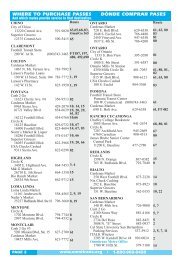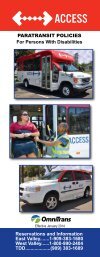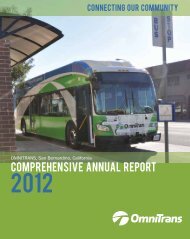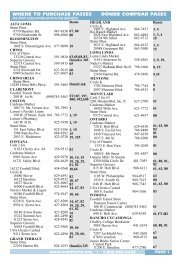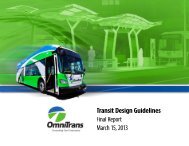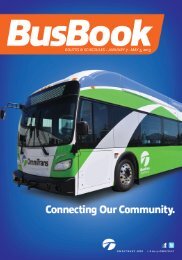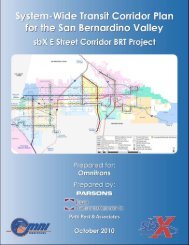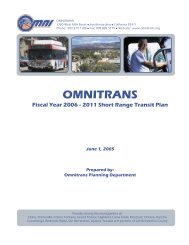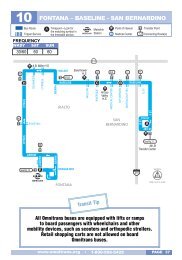Short Range Transit Plan 2008-2013 - Omnitrans
Short Range Transit Plan 2008-2013 - Omnitrans
Short Range Transit Plan 2008-2013 - Omnitrans
You also want an ePaper? Increase the reach of your titles
YUMPU automatically turns print PDFs into web optimized ePapers that Google loves.
IBI GROUP SHORT RANGE TRANSIT PLAN REPORT<br />
OMNITRANS COMPREHENSIVE OPERATIONAL ASSESSMENT<br />
& SHORT RANGE TRANSIT PLAN<br />
Public Outreach<br />
Activity<br />
<strong>Short</strong> <strong>Range</strong><br />
<strong>Transit</strong> <strong>Plan</strong><br />
Grants<br />
Emergency and<br />
Temporary<br />
Event Service<br />
Changes<br />
Special <strong>Plan</strong>ning<br />
Studies<br />
Description of Activity Legal Requirements Outreach Opportunities<br />
The <strong>Short</strong> <strong>Range</strong> <strong>Transit</strong> <strong>Plan</strong> (SRTP) provides a plan<br />
to guide the development of <strong>Omnitrans</strong> and includes<br />
the evaluation of existing service and designing new<br />
services. The SRTP is a tool to assist in the daily<br />
operation, planning, financing and management of<br />
<strong>Omnitrans</strong>.<br />
<strong>Omnitrans</strong> applies for project grants throughout the<br />
year from the Federal <strong>Transit</strong> Administration. The<br />
majority of grants fall into one of the following<br />
categories: Urbanized Area Formula Grants (Section<br />
5307) which provide capital and operating assistance<br />
to transit agencies in urban areas and Discretionary<br />
Capital Program (Section 5309) which provides<br />
discretionary capital assistance for construction of<br />
new fixed guideway systems, extensions to fixed<br />
guideway systems, buses, and bus-related facilities.<br />
Service changes that result in temporary road detours<br />
due to road maintenance, road construction, natural<br />
disasters, manmade disasters or events or activities<br />
requiring road closure. An earthquake damaging a<br />
road, a terrorist act resulting in the destruction of a<br />
highway, or a street festival that closes off a road are<br />
all examples of emergency or temporary events that<br />
require a change in service. Changes in service could<br />
include a route change or time change.<br />
Special <strong>Plan</strong>ning Studies cover a broad range of<br />
activities and planning, including purchasing land,<br />
replacing or purchasing new vehicles, and adding<br />
transit hubs to studying the feasibility of adding<br />
service to a new area. Special <strong>Plan</strong>ning Studies<br />
provide an opportunity to study a project in further<br />
detail.<br />
Legal requirements are related<br />
to the content of the plan.<br />
Section 5307 and 5309 grants<br />
require adherence to public<br />
involvement procedures<br />
identified in 23 CFR Part<br />
450.212.<br />
In accordance with 49 CFR Part<br />
635.7, in an emergency<br />
situation, a service change may<br />
be implemented without a<br />
public hearing. The “Regional<br />
Director” must be notified<br />
concerning the change within<br />
five working days of its<br />
implementation. A public<br />
hearing must be held on the<br />
changes within 60 days of the<br />
implementation, unless the<br />
change is to be in effect for 90<br />
days or less.<br />
No specific legal requirements.<br />
Stakeholder open houses, community open<br />
houses, project website, telephone hotline,<br />
meeting notices, press releases, workshop<br />
comment forms and project newsletter.<br />
Community workshops supplemented by a<br />
project database, meeting notices, customer<br />
newsletters, electronic newsletters, press<br />
releases, workshop comment forms and project<br />
fact sheets.<br />
Timely distribution of information is critical.<br />
Most activities or events leading up to<br />
emergency or temporary service changes often<br />
have little if any advance warning.<br />
Dissemination of information needs to be<br />
comprehensive and rapid. Utilization of the<br />
follow methods is recommended: <strong>Omnitrans</strong><br />
website for noticing; email blasts; bus stop flyers<br />
and newspaper advertisements.<br />
Depending on study and the scope of outreach<br />
possibilities, the following activities could be<br />
considered: community workshops<br />
supplemented by a project database, meeting<br />
notices, customer newsletters, electronic<br />
newsletters, press releases, workshop comment<br />
forms and project fact sheets.<br />
July 11, 2007 136




